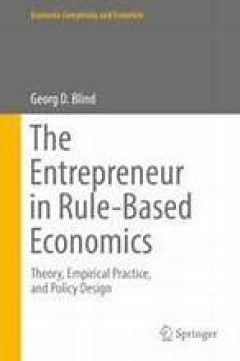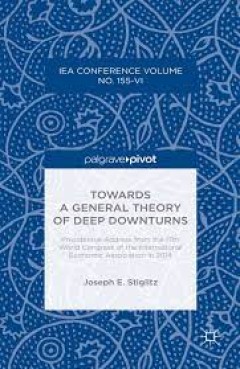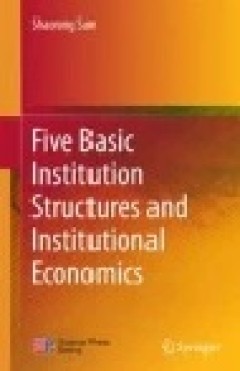Filter by

The Entrepreneur in Rule-Based Economics
This volume brings together three areas of interest: the rule-based approach, the entrepreneur, and Japan as an empirical application. It highlights the advantages of the rule-based approach for economic analysis by linking different methodological underpinnings. Using these, the author exemplifies how rule-based economics allows a systematic analysis of the entrepreneur as the key figure in br…
- Edition
- 1
- ISBN/ISSN
- 978-3-319-62779-3
- Collation
- Economic
- Series Title
- -
- Call Number
- 330

Proceedings of 2015 2nd International Conference on Industrial Economics Syst…
This book collects high-quality papers on the latest fundamental advances in the state of the art and practice of industrial economics study and industrial security engineering, providing insights that address problems concerning the national economy, social development and economic security. The book is divided into major sections including Industrial Economics; Industrial Security; Empirical …
- Edition
- 1
- ISBN/ISSN
- 978-981-287-655-3
- Collation
- Ekonomi
- Series Title
- -
- Call Number
- 330

Towards a General Theory of Deep Downturns Presidential Address from the 17t…
Joseph Stiglitz examines the theory behind the economic downturns that have plagued our world in recent times. This fascinating three-part lecture acknowledges the failure of economic models to successfully predict the 2008 crisis and explores alternative models which, if adopted, could potentially restore a stable and prosperous economy.
- Edition
- -
- ISBN/ISSN
- 978-1-137-58691-9
- Collation
- -
- Series Title
- -
- Call Number
- -

Toward Balanced Growth with Economic Agglomeration Empirical Studies of Chin…
This book explains the relationships between equality and efficiency, as well as between government and market, in urban-rural and regional development by providing theoretical frameworks and empirical evidence. Urban-rural development in China is understood from a regional perspective, while the core issue of urban-rural and regional development is cross-regional resource reallocation driven b…
- Edition
- -
- ISBN/ISSN
- 978-3-662-47412-9
- Collation
- -
- Series Title
- -
- Call Number
- -

The Towers of New Capital Mega Townships in India
With mega townships as the tool, this book analyses the complexity, scale and the challenges associated with the development paradigm in India from various built environment lenses. The Towers of New Capital is an enquiry into how these 'global fixes' are leading to territorial reorganization.
- Edition
- -
- ISBN/ISSN
- 978-1-137-58626-1
- Collation
- -
- Series Title
- -
- Call Number
- -

Five Basic Institution Structures and Institutional Economics
This book discusses a development in institutional economics and management science, which provides engineering methods for institution design. Based on the “Sun Diagram” created by the author, it uses graphics and calculations to explain that there are only five fundamental management institution structures, each of which has a particular management effect. It also demonstrates that produc…
- Edition
- -
- ISBN/ISSN
- 978-981-10-0344-8
- Collation
- XVII, 216 hlm.
- Series Title
- -
- Call Number
- -

The Morality of Radical Economics
Baiman begins with an introduction to morality and ethics in both general sciences and in economics in particular. He then guides readers through evidence of how neoclassical economics has not only failed to remain objective and value-free, but has become an ideology of apologetics protecting an immoral system. In addition to breaking down real-world examples to demonstrate his assertions, Baim…
- Edition
- -
- ISBN/ISSN
- 978-1-137-45559-8
- Collation
- XVII, 314
- Series Title
- -
- Call Number
- -

Agent-Based Approaches in Economic and Social Complex Systems VIII: Post-Proc…
Agent-based modeling/simulation is an emergent approach to the analysis of social and economic systems. It provides a bottom-up experimental method to be applied to social sciences such as economics, management, sociology and politics as well as some engineering fields dealing with social activities. This book includes selected papers presented at the Eighth International Workshop on Agent-Base…
- Edition
- Ed. 1
- ISBN/ISSN
- 978-4-431-55236-9
- Collation
- XII, 204
- Series Title
- Agent-Based Social Systems
- Call Number
- 338.9 AGE a

The Feasibility of Citizen's Income
This book is the first full-length treatment of the desirability and feasibility of implementing a citizen’s income (also known as a basic income). It tests for two different kinds of financial feasibility as well as for psychological, behavioral, administrative, and political viability, and then assesses how a citizen’s income might find its way through the policy process from proposal to …
- Edition
- -
- ISBN/ISSN
- 978-1-137-53078-3
- Collation
- XXIX, 286
- Series Title
- Exploring the Basic Income Guarantee
- Call Number
- -

Modern Classical Economics and Reality
This book presents an in-depth, novel, and mathematically rigorous treatment of the modern classical theory of value based on the spectral analysis of the price–profit–wage rate system. The classical theory is also subjected to empirical testing to show its logical consistency and explanatory content with respect to observed phenomena and key economic policy issues related to various multip…
- Edition
- 1
- ISBN/ISSN
- 978-4-431-55003-7
- Collation
- XI, 242
- Series Title
- Evolutionary Economics and Social Complexity Science
- Call Number
- -
 Computer Science, Information & General Works
Computer Science, Information & General Works  Philosophy & Psychology
Philosophy & Psychology  Religion
Religion  Social Sciences
Social Sciences  Language
Language  Pure Science
Pure Science  Applied Sciences
Applied Sciences  Art & Recreation
Art & Recreation  Literature
Literature  History & Geography
History & Geography